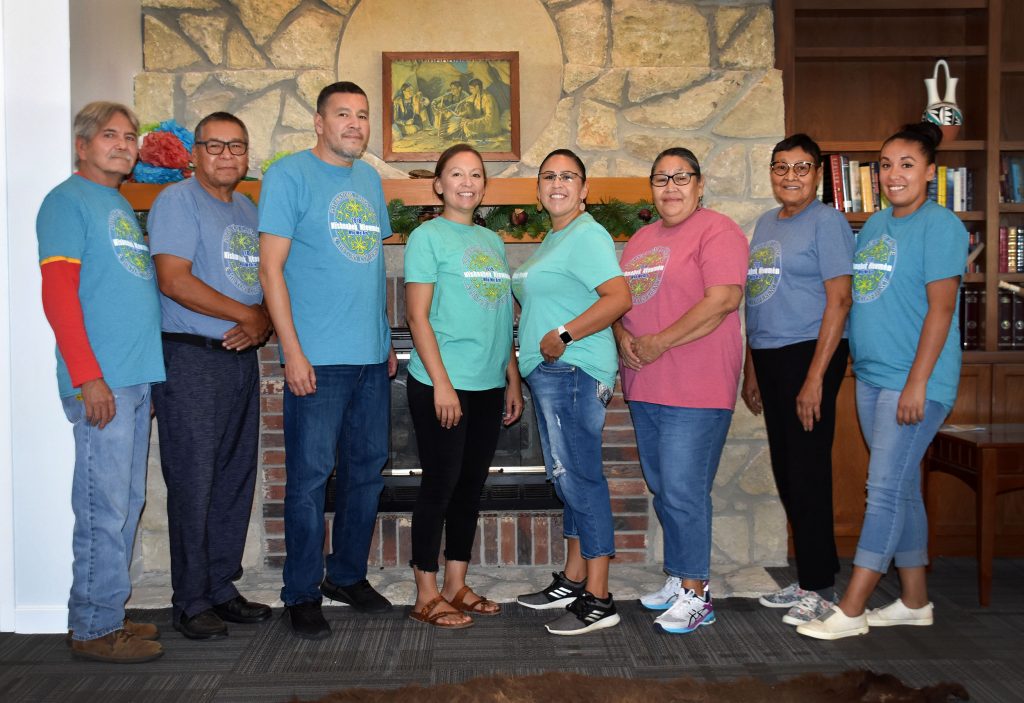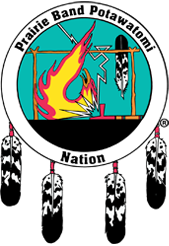
PBPN Language and Culture Staff, L to R: Language Specialist Billy Matchie, Teacher Lyman Shipshee, Apprentice Melvin Lewis, Administrative Assistant Melinda Williamson, Language Coordinator Dawn “Sogi” LeClere, Teacher Cindy LeClere, Master Speaker Pom Hubbard and Apprentice Ella Garcia.
9.13.19
By: MICHELLE SIMON
“Our language is very near extinction,” stated Dawn LeClere, PBPN Language and Cultural Department Coordinator, “in the 1700s there were over 10,000 speakers of the Potawatomi language and in 1995, the Language Institute at Haskell Indian Nations University determined there were only 50 speakers remaining, by 2002, a survey administered by the Hannahville Potawatomi revealed only 25 speakers remained. Today, there are approximately 5 fluent, first-language speakers of the Potawatomi language remaining and two are Prairie Band Potawatomi Nation members: Janice “Pom” Hubbard of Mayetta, Kansas and Don Perrot of Wisconsin.”
While these numbers reveal a dire situation, the Prairie Band Potawatomi Nation Language and Cultural Department staff are committed to keeping the Potawatomi language alive. They do this by learning the language, teaching it and preserving it.
The PBPN Language and Cultural Department utilizes a Master-Apprentice model in the acquisition of the Potawatomi Language. In 2012, Pom Hubbard became the Master Speaker and from her, Teachers Cindy LeClere, Lyman Shipshee, and Language Specialist Billy Matchie acquire the language. The Potawatomi language is a very visual language, where one word can have many subtle meanings depending on context. Hubbard has an extensive Potawatomi/English vocabulary, which allows for the teachers to learn many words, the appropriate structure, and dynamics of sentences and the subtle nuances of speaking a living language.
Dawn and her team are also in the process of developing a set curriculum for Tribal Language Teacher Certification. Once established, individuals could receive certification in the Potawatomi language which would then allow them to work in classrooms with kids on a full-time basis.
Establishing this curriculum dovetails with two of the Language departments long-term goals. One goal is to have the state of Kansas recognize the certification process which would allow the Potawatomi language to be taught in the local high school as a world language. The second goal is for students at the PBPN Early Childhood Education Center to speak Potawatomi by 2033.
In June 2019, the department added two new language apprentices Melvin Lewis and Ella Garcia. They will be the first to test the initial established curriculum.
And when staff are not learning, they are teaching. The PBPN Language and Culture Department provides approximately 20 classes per week to the Potawatomi Community. The staff visits the Early Childhood Education Center, the Royal Valley Grade School and hosts teen and adult classes at their campus located just west of 158 and K roads on the Prairie Band Potawatomi Common Land. The Language and Culture Department campus includes the language department building that provides a holistic learning atmosphere, along with a language house which is used for language immersion activities, a cook shack and plenty of space outdoors for gardening and playing games.
At Royal Valley, students in kindergarten through 4th grade can opt-in to the Potawatomi language class at the beginning of the school year. The course is open to all children and about 164 students, or three-quarters of the student body, participate.
Teen class is available at the language department on Wednesday nights from 6 p.m. to 7:30 p.m. and anywhere from 10 to 30 students show up each week. The next 6-week program begins on September 18, 2019.
An adult session is also available in the evenings on Mondays from 5:30 p.m. to 7:30 p.m. at the language department with the next 6-week program starting on Monday, September 16, 2019.
If committing to a class seems like too much, the Language staff can also arrange one-on-one sessions for those who are interested, for both language or cultural activities such as learning to make moccasins, dresses, ribbon shirts, belts and other items.
This summer the department hosted four, 2-day sessions for teens aged 13 and up to learn the language and culture. During the sessions the teachers also impart Nishnabek values, explaining why these skills and activities are important. At the first session, young men and women learned about cooking on a traditional fireplace, and all that it entails. The young men gathered wood and took care of the fire while the young women prepared and cooked ninwezheks (milkweeds), wapkon (corn), kahkahzwebo (roasted ground corn) and fried bread.
At the second session, participants learned about plants and gardening. The teachers taught the importance of traditional foods and the stories that go along with them. The young men and women were able to spend time in the garden, to take care of it by weeding, watering and talking to the plants.
The third and fourth sessions were focused on fishing and harvesting traditional foods, weaving and sewing dish bags.
The third major function of the department is the preservation and archival of the Potawatomi language. The department staff is responsible for transcribing documents and recordings and keeping both hard copies and digital records of materials. The department has also created a Potawatomi language app, “Nïshnabemwėn” available for download in the Apple App Store and can be used with any Apple device such as an iPhone or iPad. The Language Specialist also assists individuals with language translation requests and maintains a language database.
The PBPN Language and Culture Department staff are not alone in their journey to preserve the Potawatomi language, a majority of the other Potawatomi bands are also deeply committed to preserving the Potawatomi language. In June, the Pokagon Potawatomi hosted a week-long Potawatomi language immersion camp, where PBPN staff presented twice. The camp included a tour of the Pokagon’s sacred sites, sharing knowledge of constellations and other culturally relevant material.
The PBPN language department regularly works with the Citizen Potawatomi Nation, Forest County Potawatomi and the Pokagon Band of Potawatomi. Where PBPN has focused on language acquisition as our primary avenue for language sustainability, linguists from FCP and CPN have done extensive work collecting and documenting the grammar of the Potawatomi language. While the loss of the last 5 fluent, first-language speakers looms ahead, the Potawatomi people have taken several measures to ensure the Potawatomi language will not be lost.
It is never too late to start learning or sharing. The staff of the PBPN Language and Culture department encourage the community to use their Potawatomi words and language skills each day with their family and friends. LeClere reminds us, “Our language helps us to see the world through the eyes of our ancestors. It ties us to our values, our way of life, our beliefs. Our language helps us see the beauty in everything, the importance in everything, and when you look at our world that way it is a beautiful place.”
